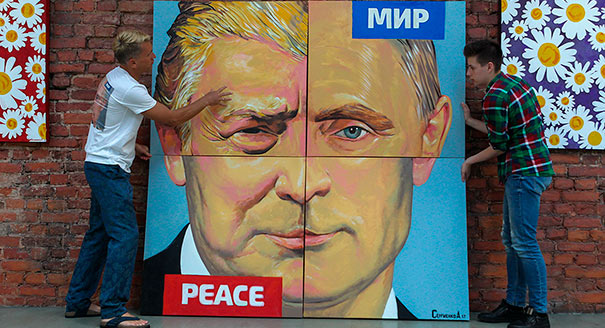Rarely if ever have American and Russian leaders met against a background of such intense public distrust. As presidents Vladimir Putin and Donald Trump prepare for their summit in Helsinki on July 16, anti-American feelings are at an all-time high in Russia. Yet Russians do hope for some kind of rapprochement with the Americans—so long as Russia emerges from it with respect.
In recent polling by the independent Levada Center, 69 percent of Russians expressed negative feelings toward the United States. That figure is a little lower than the 81 percent who responded in that fashion during the peak of the Ukraine crisis in 2014–2015. But another question elicits the most negative response yet in Levada polls. In 2018, a record 78 percent of Russians volunteered that they regard the United States as the most unfriendly foreign country.
Expectations are low. The bubbles from the champagne bottles opened in the Russian parliament the day Trump was elected president in 2016 quickly burst. At the end of last year only one-tenth of Russians said that relations between the two countries had improved under Trump.
Yet in a paradoxical way this negativity means that the public believes the meeting is important. It wants to see change. Of what kind?
Over the past two years we have seen a slow rise in public dissatisfaction with the Kremlin’s approach to foreign policy. It is not that Russians disagree with the policy. On the contrary, they believe that Putin has scored a major achievement by making Russia a great global power again—that as Trump talks about “Making America Great Again,” Putin has already reached that goal. The point is that as Russia is now a great power once again, Russians believe it is time for Putin to focus on a domestic agenda and tackle socioeconomic concerns. Ordinary people say that economic power should be one constituent of being a great power.
Both polls and focus groups show that a clear majority of Russians agree with the statement “We help other countries too much” and would rather see money spent on their own country’s social needs rather than the needs of other countries. Moreover, in April this year, for the first time more than half of survey respondents stated that Russia is internationally isolated. Although a majority of Russians still support the government’s unyielding stand on sanctions and foreign relations, that number is steadily dwindling.
This is the background to the Putin-Trump summit. In our focus groups, conducted in early July 2018, many people said that they pinned some hopes on the meeting and wished that the two leaders would agree “on something decent.” Their wish list of issues for agreement included “Syria,” “oil,” and “removal of sanctions.” They believe that the two countries could cooperate on nuclear nonproliferation, the Syrian conflict, and the fight against international terrorism. Despite their negative feelings toward the United States, people also called it a powerful and prosperous country. There were some pragmatic hopes that if Putin and Trump could do a deal, then Russia might have more resources to spend on social needs, such as pensions, for instance.
It is important, however, to stress that our respondents are not asking Putin to make big concessions. They want him to “stand his ground” and “hold the line” with Trump. A persistent conclusion from recent Levada Center surveys is that Russians believe that the Americans interfere in their domestic politics, but Russia does not interfere in theirs. We should note that according to a Chicago Council survey (January 2018) Americans believe the polar opposite.
The prevailing view from discussions on America in our focus groups is: We will never be friends, but that does not mean that we should be fighting with one another; instead, we should adopt a principle of “let’s not tread on each other’s toes.”
The Putin regime has been sustained by the idea that it is a besieged fortress. The surveys show that that argument is gradually losing its appeal for the Russian public. But there is an important catch. Although there is a dwindling appetite for confrontation, there is also the conviction that if we cease to be tough and aggressive, “they” will no longer afford us the respect and recognition we deserve. Putin himself recently expressed this sentiment when he said, “Nobody listened to us before, now you have to listen to us!”
The idea that the West needs to “listen to” and respect Russia is a constant theme in the discourse of both the public and the elite. Practically speaking, that means that some Russians believe if there was a gesture from Trump in Helsinki along the lines of inviting Russia back into the G8, it would be possible to start contemplating peaceful coexistence with the United States, instead of confrontation.
Russian-U.S. relations have been scarred by many failed attempts at rapprochement. This time around the specter of Crimea, Donbas, MH-17, and the Skripal case haunts the relationship. But it can hardly be said to be any worse than the moment Leonid Brezhnev met Richard Nixon in the late Soviet era. The Russian public wants one thing that was present in that era, “good faith”: a genuine desire to talk and try to agree. And it wants that good faith from its own president as much as it wants it from President Trump.
